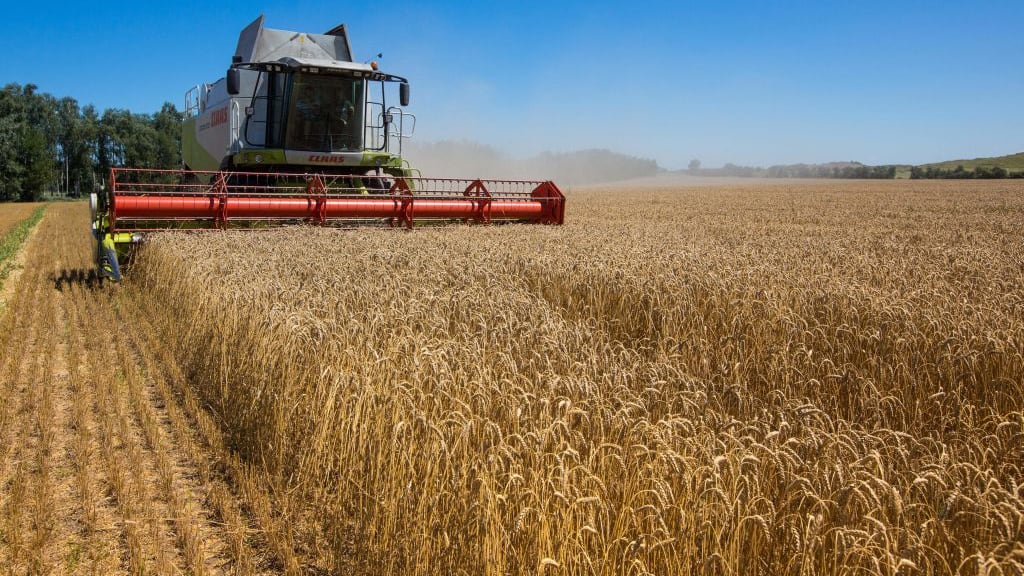World Food Program chief: Ukraine war has damaged global food security, creating 'a catastrophe'


A free daily email with the biggest news stories of the day – and the best features from TheWeek.com
You are now subscribed
Your newsletter sign-up was successful
The war in Ukraine is already having a devastating impact on hungry people around the world who rely on the country's wheat to survive, the executive director of the United Nations World Food Program said Tuesday.
While speaking to the UN Security Council, David Beasley declared that Russia's invasion of Ukraine has created "a catastrophe on top of a catastrophe," and with so many Ukrainian farmers joining the fight and leaving behind their crops, the world should brace for something "beyond anything we've seen since World War II."
Combined, Ukraine and Russia account for nearly 30 percent of global wheat exports, 20 percent of corn exports, and more than 80 percent of sunflower oil exports, Wired reports. With ports and shipping routes closed, corn that was harvested last fall in Ukraine can't go anywhere, and it's expected that when wheat is ready in July, there won't be enough labor to or fuel to run the combines.
The Week
Escape your echo chamber. Get the facts behind the news, plus analysis from multiple perspectives.

Sign up for The Week's Free Newsletters
From our morning news briefing to a weekly Good News Newsletter, get the best of The Week delivered directly to your inbox.
From our morning news briefing to a weekly Good News Newsletter, get the best of The Week delivered directly to your inbox.
Prior to the invasion, the World Food Program was providing rations to 125 million people, Beasley said, but with the prices of food, fuel, and shopping sharply rising, the agency's monthly costs have gone up $71 million. This means "there will be 4 million less people we'll be able to reach," Beasley added. In Yemen, another country devastated by war, the World Food Program has had to cut the food rations of 8 million people in half, and "now we're looking at going to zero rations," Beasley said.
The World Food Program purchases 50 percent of its grain from Ukraine, and Beasley said it's not just his program that will feel the sting — Egypt, for example, typically gets 85 percent of its grain from the country. The UN has to ensure that food insecurity in places outside of Ukraine is addressed, in order to "avoid famine, destabilization of nations, and mass migration," Beasley said. "If we don't, the world will pay a mighty price and the last thing we want to do as the World Food Program is taking food from hungry children to give to starving children."
A free daily email with the biggest news stories of the day – and the best features from TheWeek.com
Catherine Garcia has worked as a senior writer at The Week since 2014. Her writing and reporting have appeared in Entertainment Weekly, The New York Times, Wirecutter, NBC News and "The Book of Jezebel," among others. She's a graduate of the University of Redlands and the Columbia University Graduate School of Journalism.
-
 How to Get to Heaven from Belfast: a ‘highly entertaining ride’
How to Get to Heaven from Belfast: a ‘highly entertaining ride’The Week Recommends Mystery-comedy from the creator of Derry Girls should be ‘your new binge-watch’
-
 The 8 best TV shows of the 1960s
The 8 best TV shows of the 1960sThe standout shows of this decade take viewers from outer space to the Wild West
-
 Microdramas are booming
Microdramas are boomingUnder the radar Scroll to watch a whole movie
-
 What would a UK deployment to Ukraine look like?
What would a UK deployment to Ukraine look like?Today's Big Question Security agreement commits British and French forces in event of ceasefire
-
 Would Europe defend Greenland from US aggression?
Would Europe defend Greenland from US aggression?Today’s Big Question ‘Mildness’ of EU pushback against Trump provocation ‘illustrates the bind Europe finds itself in’
-
 Is conscription the answer to Europe’s security woes?
Is conscription the answer to Europe’s security woes?Today's Big Question How best to boost troop numbers to deal with Russian threat is ‘prompting fierce and soul-searching debates’
-
 Trump peace deal: an offer Zelenskyy can’t refuse?
Trump peace deal: an offer Zelenskyy can’t refuse?Today’s Big Question ‘Unpalatable’ US plan may strengthen embattled Ukrainian president at home
-
 The Baltic ‘bog belt’ plan to protect Europe from Russia
The Baltic ‘bog belt’ plan to protect Europe from RussiaUnder the Radar Reviving lost wetland on Nato’s eastern flank would fuse ‘two European priorities that increasingly compete for attention and funding: defence and climate’
-
 How should Nato respond to Putin’s incursions?
How should Nato respond to Putin’s incursions?Today’s big question Russia has breached Nato airspace regularly this month, and nations are primed to respond
-
 What will bring Vladimir Putin to the negotiating table?
What will bring Vladimir Putin to the negotiating table?Today’s Big Question With diplomatic efforts stalling, the US and EU turn again to sanctions as Russian drone strikes on Poland risk dramatically escalating conflict
-
 The mission to demine Ukraine
The mission to demine UkraineThe Explainer An estimated quarter of the nation – an area the size of England – is contaminated with landmines and unexploded shells from the war
